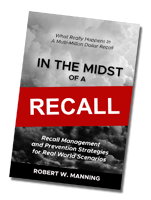Public Health Alert
April 25, 2023
FSIS Issues Public Health Alert for Ready-to-Eat Meat Soup Products Due to Possible Contamination
FSIS Announcement
WASHINGTON, April 25, 2023 – The U.S. Department of Agriculture’s Food Safety and Inspection Service (FSIS) is issuing a public health alert due to concerns that ready-to-eat meat soup products may have been prepared, packed, or held under insanitary conditions, which may result in the product spoiling prematurely. FSIS is issuing this public health alert to ensure that consumers are aware that these products should not be consumed. A recall was not requested because the products are no longer available for purchase.
The problem was discovered when the establishment notified FSIS that they had received multiple consumer complaints regarding bloated soup packages. Upon further review, the establishment found that some product spoiled prematurely. The establishment’s lab testing of the prematurely spoiled products found high levels of spoilage bacteria in the products.
Information extracted from the USDA.gov website
RECALL REVIEW
Although there is no additional details to this recall, there are a number of factors that could be investigated to prevent a similar event in one’s organization.
Focusing on Insanitary Conditions as a Possible Factor and Root Cause
- Incoming Ingredient Quality – Review of COA (Certificate of Analysis that is a legal document the supplier provided each shipment of ingredients. It contains analytical results of the quality of the ingredients)
- COA’s should be reviewed when the ingredients are received.
Additionally, as a best practice, for ingredients of concern, one should
randomly have ingredients tested at a 3 rd party lab and compared to the
results received and shared with the supplier. This will inform the supplier
you are checking their ingredients.
- COA’s should be reviewed when the ingredients are received.
- Sanitary Conditions of the Incoming Shipment
- Review receiving procedures, looking for truck damage / leakage, potential contaminating items in the trailer or on the pallets (material from other products), and rodent excrement.
- Infrastructure Conditions
- Roof Leaks
- Rodent Activity
- Visual Mold Observed
- Housekeeping and Cleanliness of One’s Workspace(s)
- Sanitation of Utensils and Equipment – Has the equipment been washed and sanitized per your SOP’s (Standard Operating Procedures)?
- CIP – Clean in Place
- COP – Clean out of Place
- Opportunities for Cross-Contamination
- Storage Conditions of Ingredients
- Does your organization have charts to track the temperatures and humidity
- Opened and / or Expired Ingredients
- Employees
- Good Manufacturing Practices (GMP’s)
- Employee Training and Certification for Critical Operations
- Post process and Post Packaging Handling and Storage Practices
- Have these been followed per your SOP’s?
- Finished Product Storage Conditions
- Transportation Temperature Records
- Utility Review – Steam, Water, and Air Quality
While we or the manufactured my never identify exactly what happened that contributed to this recall, hopefully the above material is a good place for you to start your investigation.
Together we can all do our part to be advocates for prevention and drive out recalls worldwide!





